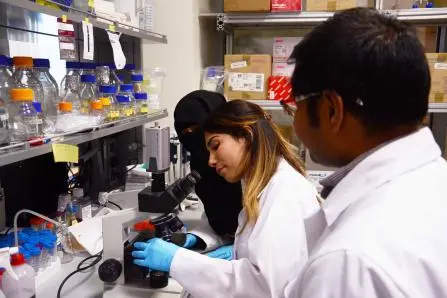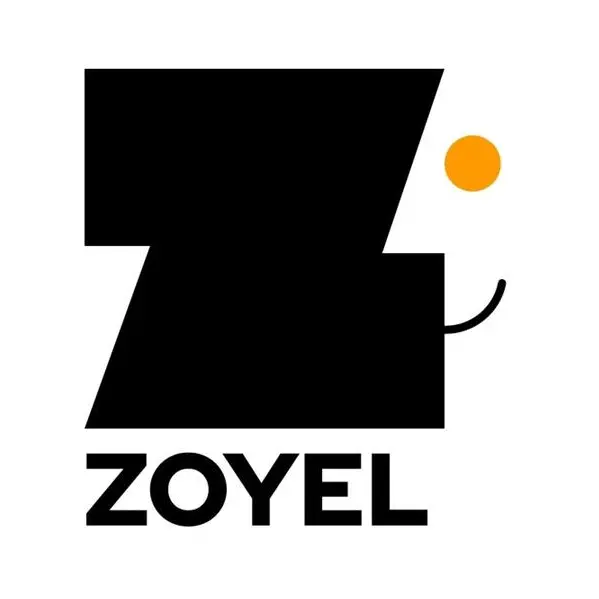PHOTO
- Nanomedicine has the potential to overcome these intrinsic limitations of conventional chemotherapy.
- Nanomedicine involves the use of nanocarriers, which are typically < 200 nm in diameter, as transport modules for substances that are used to diagnose, track or treat diseases.
- NYUAD researchers have developed nanocarriers to effectively deliver chemotherapeutics specifically to cancer cells, while minimizing exposure of healthy tissue.
- Findings have been published in an article, pH-Responsive High Stability Polymeric Nanoparticles for Targeted Delivery of Anticancer Therapeutics, in the journal Communications Biology, and selected by the editors as a research highlight.
Abu Dhabi: A team of researchers at NYU Abu Dhabi has developed a biocompatible, biodegradable, and economical nanocarrier for safer and more effective delivery of anticancer drugs. Researchers demonstrate that the novel pH-responsive hybrid (i.e. multi-component) nanoparticles can be loaded with a wide range of chemotherapeutics to effectively and specifically target cancer cells, as reported in their paper published on March 3, 2020, in the journal Communications Biology.
Conventional chemotherapy drugs work primarily by interfering with DNA replication and mitosis (a type of cell division) in order to induce cell death in rapidly dividing cancer cells, thereby minimizing tumor growth. The limitations of conventional chemotherapy include poor solubility, short blood circulation time, lack of selectivity, toxicity to healthy tissue, drug resistance, and tumor recurrence. Consequently, it becomes necessary to administer high doses of chemotherapeutics to ensure that a sufficient amount reaches the tumor to cause the desired effect in cancer cells. Unfortunately, the high drug doses lead to damage to healthy tissue, resulting in a range of side-effects that include nausea, hair loss, fatigue, decreased resistance to infection, infertility and organ damage.
Cancer nanomedicine – the use of nanocarriers to diagnose, track, and treat cancer – has the potential to overcome the limitations of conventional chemotherapeutics. However, the practical application of many nanocarriers as cancer drug delivery systems is often hampered by a number of issues, including poor circulation stability, inadequate accumulation in target tumor tissue and inefficient uptake and/or transport in target cancer cells.
As reported in the paper, pH-Responsive High Stability Polymeric Nanoparticles for Targeted Delivery of Anticancer Therapeutics, NYUAD’s Magzoub lab in collaboration with Professor Francisco N. Barrera’s lab at the University of Tennessee at Knoxville, have developed nanocarriers that can overcome complications associated with conventional chemotherapeutics as well as current nanocarriers.
“We used a simple approach and readily available low-cost materials to prepare biocompatible and biodegradable pH-responsive hybrid nanoparticles for the effective delivery of chemotherapeutics specifically to tumor cells,” said Loganathan Palanikumar, a research associate in the Magzoub lab and first author of the study. “Thus, unlike many nanocarriers, which require complex chemistry and costly equipment and materials, our nanoparticles can be easily prepared and used by other researchers, even those with limited resources,” added Palanikumar.
The nanoparticles consist of a US Food and Drug Administration (FDA)-approved polymer core wrapped with a biocompatible and biodegradable protein shell. The core can be loaded with a wide range of cancer therapeutics. Designed to prolong the blood circulation time, the protein shell also serves to ensure that the nanocarrier remains stable long enough to reach the target location. Finally, the nanocarrier is decorated with a pH-responsive peptide, developed by the Barrera lab, which facilitates the cellular uptake specifically in cancer cells within the acidic environment of solid tumors. Following efficient cellular uptake, the unique conditions within cancer cells degrade the hybrid nanoparticles and release the loaded chemotherapeutic drugs.
Palanikumar, along with cancer researchers in the Magzoub lab, Sumaya Al-Hosani and Mona Kalmouni, and Vanessa Nguyen, at the time a graduate student in the Barrera lab, with support from Research Instrumentation Scientists at the Core Technology Platforms at NYUAD, Liaqat Ali and Renu Pasricha, extensively characterized the properties of the nanocarrier in a wide range of cancer cell lines and in tumor-bearing mice. The drug-loaded hybrid nanoparticles showed potent anticancer activity, leading to a substantial reduction in tumor volume and mass and prolonged survival, while exhibiting no adverse effects to healthy tissue.
“These novel pH-responsive hybrid nanoparticles are a highly promising cancer drug delivery platform that combines high stability with effective tumor targeting and triggered release of chemotherapeutic agents in cancer cells,” said NYUAD Assistant Professor of Biology Mazin Magzoub.
-Ends-
About NYU Abu Dhabi
NYU Abu Dhabi is the first comprehensive liberal arts and science campus in the Middle East to be operated abroad by a major American research university. NYU Abu Dhabi has integrated a highly-selective liberal arts, engineering and science curriculum with a world center for advanced research and scholarship enabling its students to succeed in an increasingly interdependent world and advance cooperation and progress on humanity’s shared challenges. NYU Abu Dhabi’s high-achieving students have come from more than 115 nations and speak over 115 languages. Together, NYU's campuses in New York, Abu Dhabi, and Shanghai form the backbone of a unique global university, giving faculty and students opportunities to experience varied learning environments and immersion in other cultures at one or more of the numerous study-abroad sites NYU maintains on six continents.
© Press Release 2020Disclaimer: The contents of this press release was provided from an external third party provider. This website is not responsible for, and does not control, such external content. This content is provided on an “as is” and “as available” basis and has not been edited in any way. Neither this website nor our affiliates guarantee the accuracy of or endorse the views or opinions expressed in this press release.
The press release is provided for informational purposes only. The content does not provide tax, legal or investment advice or opinion regarding the suitability, value or profitability of any particular security, portfolio or investment strategy. Neither this website nor our affiliates shall be liable for any errors or inaccuracies in the content, or for any actions taken by you in reliance thereon. You expressly agree that your use of the information within this article is at your sole risk.
To the fullest extent permitted by applicable law, this website, its parent company, its subsidiaries, its affiliates and the respective shareholders, directors, officers, employees, agents, advertisers, content providers and licensors will not be liable (jointly or severally) to you for any direct, indirect, consequential, special, incidental, punitive or exemplary damages, including without limitation, lost profits, lost savings and lost revenues, whether in negligence, tort, contract or any other theory of liability, even if the parties have been advised of the possibility or could have foreseen any such damages.




















